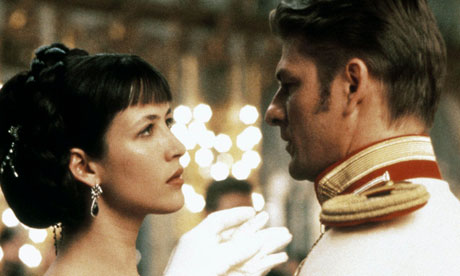Russian Literature is Best Sex Education for Young People, Says Ombudsman
The Guardian September 21, 2013

Leo Tolstoy's Anna Karenina tells the story of a woman trapped in a loveless marriage who begins a passionate affair. Photograph: Allstar/Cinetext/Warner Bros.
Forget condoms, contraceptive pills and chlamydia, and turn instead to Chekhov, Tolstoy and Gogol. That is the message from Russia's children's ombudsman, Pavel Astakhov, who has opposed the introduction of sex education to schools and says young Russians can learn everything they need to know about love and sex from Russian literature.
"I am against any kind of sex education among children," said Astakhov in a television interview. "It is unacceptable to allow things that could corrupt children."
Despite having one of the world's fastest-growing HIV epidemics, Russia has no sex education in schools, owing to the influence of the Russian Orthodox church and conservative social forces.
Astakhov, a powerful official who reports directly to the president, Vladimir Putin, now wants legislation to ensure sex education does not sneak on to the curriculum. Instead, he suggests reading the classics.
"The best sex education that exists is Russian literature," said Astakhov. "In fact, literature in general. Everything is there, about love and about relationships between sexes. Schools should raise children chastely and with an understanding of family values."
This is not the first time government officials have moved to protect the "innocence" of Russian children.
Over the summer, parliament passed a law to ensure children are not subjected to "gay propaganda", which is defined as any information suggesting homosexuality is normal.
Astakhov was also a vocal advocate of the ban this year on the adoption of Russian children by US citizens.
Rights groups said that rather than banning sex education, the exact opposite is needed, and called on the government to allow children to be educated about sex and sexuality.
"All our surveys show that 90% of Russians are sexually experienced by the age of 17, and the government wants to deny them the right to be properly informed about their choices," said Tanya Evlampieva, of the Russian campaign group Focus-Media.
"Sex education isn't just about the act of sex," she said.
"Children should be able to discuss things like how to choose the right partner, and how to say no. By denying young people access to accurate information, we put them at increased risk of unplanned pregnancies and contracting HIV."
Russia has more than 1 million people living with HIV, and half of new cases are now sexually transmitted.
Astakhov admitted that in the modern world children might find out about sex from outside school, and suggested that parents should watch over their offspring carefully and be ready to answer questions.
Rather than introduce sex education to schools, he suggested it might be worthwhile to reintroduce the Soviet era subject of "ethics and the psychology of family life" for older teenagers.
Sex education from the Russian classics
Eugene Onegin, Alexander Pushkin, 1833
Onegin, a Petersburg dandy, travels to the countryside with his friend Lensky to meet Lensky's fiancee Olga and her sister Tatyana, who declares her love for him in a passionate letter. Onegin rejects Tatyana callously and flirts with Olga from boredom, which leads to a duel with Lensky, whom he kills. Years later, he meets the married Tatyana and professes his love for her. Although it is requited, she refuses to leave her husband, and Onegin is plunged into despair.
Anna Karenina, Leo Tolstoy, 1877
Anna is trapped in a loveless marriage to the stiff government official Karenin, and begins an affair with the dashing Count Vronsky. Her marriage collapses, and she becomes increasingly depressed and paranoid about her relationship with Vronsky. Angry and upset, Anna commits suicide by throwing herself under a train.
The Abyss, Leonid Andreyev, 1901
A short story that caused huge controversy on its publication, and was part of a decadent, fin-de-siècle school of literature in Russia obsessed with death and sex. A young couple in love go for a romantic walk in the forest at dusk, but get lost and are accosted by a gang of youths. They beat up the man, drag off the woman and rape her. When the man comes to, he finds his wife naked and unconscious but alive. He begins kissing her body passionately, and then "is swallowed by the dark abyss". The story ends.
Novel With Cocaine, M Ageyev, 1934
Set in 1917, the novel deals with the sexual coming of age of a young man in Moscow. "Sporting a face powdered like a clown and eyes lined with vaseline, I would stroll up and down the boulevard and try to catch the eye of every passing woman," writes the protagonist. If they smiled at him, he knew they were a "prostitute or a virgin"; if they looked terrified, he began his seduction routine.
Lolita, Vladimir Nabokov, 1955
Written in English by the Russian emigré writer Vladimir Nabokov, Lolita charts the all-consuming obsession and subsequent sexual relationship between a middle-aged professor, Humbert Humbert, and Dolores Haze, a 12-year-old girl.











